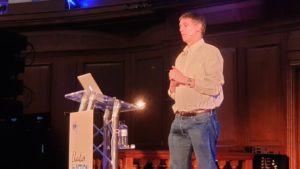Paul Curzon gave an inspirational talk at the Education in Action study day on Computer Science, on 27th November 2018. He spoke to around 700 sixth formers at the Emmanuel Centre in central London drawing on his interaction design work as part of PAMBAYESIAN.
on his interaction design work as part of PAMBAYESIAN.
Paul’s talk was about human computer interaction: and how important it is that computer scientists understand people not just technology, using research on usability of medical devices as the backdrop. It drew on his EPSRC funded work on the PAMBAYESIAN and CHI+MED projects. He talked about the importance of understanding real user needs and of designing to prevent human error. He used magic and illusions to show how you can engineer systems so people make mistakes … or not. He also talked about his work creating personas (fictional but detailed descriptions of potential users of technology) of people with rheumatoid arthritis. The aim is to give vivid descriptions of the lives of patients to help designers design for their real needs. Computer Science does not just involve writing programs – here Paul’s work here involves writing fiction too, but fiction with a purpose.
Feedback from the event organisers was really positive:
“Your talk went down incredibly well with the overwhelming majority of sixth formers saying that it was their favourite of the day. I’m absolutely delighted that you pitched your talk so expertly and really caught the imaginations of the computer science students. The event is all about inspiration which is exactly what was delivered!”
“Really enjoyed this down to earth talk. Computer Science must evolve around user needs. A message that is as valid now as it was 30 years ago and should be central to any project.”
Paul developed the talk as part of his work for the Institute of Coding and cs4fn, in conjunction with the PAMBAYESIAN project, inspiring students about digital careers.





Recent Comments